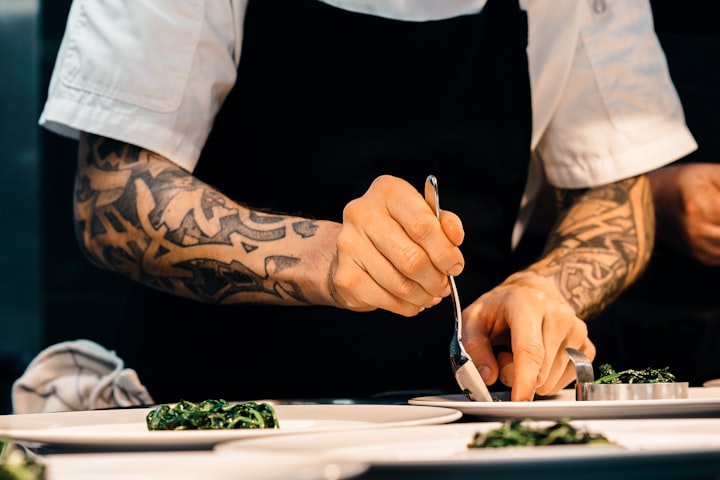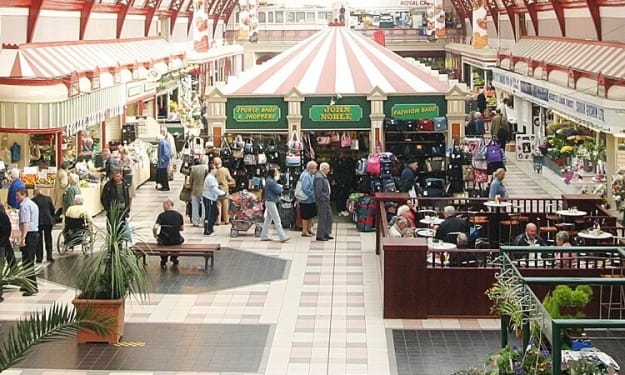Two chefs one dish
Nature and nurture of cooking art

Cooking nature
No dish is ever the same. As an activity that follows a recipe and methods of preparation, it is strangely undefined what the result will be. You might know the dish already so you aim for those flavours or you might be able to describe it. But the result is never the same. Even 2 chefs with experience cooking the same exact recipe for years will have a slightly different result in the end.
Why does every chef cooks the same dish differently? It is an impossible question because you have to judge if the dish is exactly the same for each chef but human perception changes from moment to moment. If the panel of judges is testing one meal after another, their stomachs will be fuller, and their mouths drier or more watery. What they see first, second, third and fourth time around will become less impressive. To make an unbiased judgement the jury has to know what is happening to them on the micro level but how can they judge that?
Human taste and perception are at the heart of the problem because, of course, it is possible to make the same exact dish, not to 100% point but close enough that they are indistinguishable because that’s what truly matters. The issue with the idea that the same dish can be replicated, is with the goal to make food ingredients uniform, forget about preferences and standardize a very creative, beautiful and inspiring field of cooking as a craft.
Cooking is a way to transform raw into an ingredient or a dish. To make greater out of the simple parts. Cooking is a creative field as well as a scientific one. There is no cooking without change and transformation. It comes in many forms - heat exchange, drying, enzymatic breakdown, dissolving, and concentrating among many other methods within physical, microbiological and chemical realms. Many of these methods are used in sequences to build layers of flavours, colours, forms and structures.
The process of cooking is an art because the limit is imagination. In this way, there are no boundaries beyond those that are edible. One dish can be made for one or hundreds of people. Depending on who you are cooking for or what your goal is, the result will be wildly different. If you are trying to amaze or intrigue the eater, the food you serve would vary in its shapes and colours, to capture attention and break the expectation. On the other hand, if the goal is to satisfy a picky eater, cooking would involve an elaborate sequence of procedures to distil the essence of flavour into one magic concoction. Feeding the masses will require simpler processes or highly skilled groups of people cooking at the required speed and precision. It is the chef's choice.
After all, whose problem is it that the dish isn’t the same when it is cooked daily?
One way to look at it is to follow the ingredients. Day to day the quality of the fresh produce changes, some ripen, and others rot. Dry spices are at their best when toasted to active and freshly ground, while dried herbs lose their potency with time. Every piece that goes into the cooking pan will have its perfection and decay conditions. In hands of an experienced professional, those products get a treatment required to brighten smells and flavours to make them special. Though skill can get a dish closer to the ideal, there is only so much one can do with the ever-changing fresh, dry frozen, and leftover foodstuffs. Food is not just food for us, you see, it is also food for tiny creatures that eat what they want.
From another point, cooking depends on the hands that are working with those ingredients. Skill, experience, talent, tastebuds, and the situation that the cook is in will dictate how the food will be done. A simple approach is to consider cooking with and without experience. Later will already know what the final result suppose to taste like, and she will make all attempts necessary to perfect every step that leads to success. Experience is as much about what the end result will be as it is a knowledge of the consequences - what mistakes to avoid, what shapes, flavours and sizes ingredients must be, or what is the perfect property of the ingredient when it is done cooking. The second factor is of course the knowledge of causation, flavour profiles, how to fix things if something went wrong or when to stop and start again. And the final factor is a balance of mixtures found only through trial and error.
Now, consider the space you are in. Not the mental state (which is still very important) but the physical space. Equipment around you and quality of it, induction or a gas cooker, sharpness of the knife, temperature in the kitchen and so on. The environment will influence the result. Depending on what you are cooking. Will it affect the cooking enough to change the outcome if you know what you are doing? Maybe. It is situational, working in the new kitchen will slow down the work, and using different equipment will affect the cooking times or uniformity of cooking. Space is a factor to consider last, after the ingredients and expertise, but it is important nevertheless. A sharp knife will do smooth work in experienced hands.
Lastly and most importantly, cooking is a creative field which requires artistic expression. Surely in the restaurant, you are expecting your food to taste a certain way, the same every time. That is a big part of good quality service, to provide and satisfy expectations.
Even at home, when cooking, you want to feel like you have done the same exact job as the chef following their recipes, no matter what your skill level and the quality of ingredients are.
Nurture art
When I'm not following the recipe or a blueprint, I think of the recipe as a blank sheet of paper. It can be a poem or an essay, a book or a short story, a motivational speech or just a couple of simple words. Cooking allows for substitutions, pairing and avoidance of ingredients. It is easier with skill and knowledge, it will taste better when you know your products but it doesn't have to be complicated. Just like humans, food is complex to infinity and will never stop giving new eating experiences. However, follow the recipe and you will be satisfied every time.
Two chefs cooking one dish using the same exact ingredients with similar techniques and knowledge will achieve an identical result. Indistinguishable enough to pass the test of the human taste buds. In the end, every aspect of food is as important as how much we want to think about it. If the goal is to be happy with your meal, look around you, enjoy the sound, smell and company that is with you and next time replicate that and the taste will follow.
When cooking, imagine what you want food to be, and where you want it to take you. Learn theory and practice your skills - to make the same exact dish, but don't be afraid to add, replace and take out because cooking is an art. Fail, get feedback and listen to improve. And at the end, share the recipe to see how others can bring it to life too.
-TheFoodGuy
About the Creator
The Food Guy
I read about food politics like it's a Harry Potter.
Eating my way through culture and cooking up the future.






Comments
There are no comments for this story
Be the first to respond and start the conversation.